#Writing and Drawings – Bob Dylan
Text
The poetry that inspired Jeff Buckley
Aimee Ferrier
Sun 1 October 2023 21:15, UK
Voices as incredible as the one belonging to Jeff Buckley don’t come around too often. Unfortunately, after releasing one record, Grace, Buckley, with all his potential, was taken away too soon. At the age of 30, the singer went for a swim from which he never returned, drowning in the Mississippi River.
Yet, his legacy lives on as one of the most influential artists to emerge from the 1990s, and his music is widely celebrated today for its emotional and lyrical complexity. Not only did Buckley possess an otherworldly voice, but he was also an extremely gifted guitar player and writer, with all his talents combining to create a masterful body of work.
Even when Buckley was covering other artists’ songs, such as ‘Lilac Wine’, ‘The Other Woman’ and ‘Hallelujah’, he imbued the pieces with his own distinctive style. Yet, his penchant for covers wasn’t a reflection of an aversion to writing. Buckley knew how to pen a stunningly poetic track, with songs like ‘Lover, You Should’ve Come Over’ and ‘Morning Theft’ suggesting that even if Buckley didn’t have the vocal pipes he was gifted with, he’d get by just fine as a writer.
Buckley took inspiration from many different writers and musicians when writing his own songs. Musically, Buckley looked back to folk artists like Leonard Cohen, Bob Dylan and, of course, his own father, Tim Buckley, from whom he was estranged. Elsewhere, he loved the work of Pakistani singer Nusrat Fateh Ali Khan, the rich tones of Nina Simone, and Led Zeppelin, calling Robert Plant “my man”.
However, when it came to his literary inspirations, Buckley had an extensive book collection, which he no doubt looked to for ideas when writing his lyrics. He owned a lot of poetry, with Rainer Maria Rilke proving to be a particular favourite. Not only did Buckley own Dunio Elegies, Rilke on Love and Other Difficulties: Translations and Considerations Poems from the Book of Hours, but he also owned his epistolary collection Letters to a Young Poet.
Buckley was also a fan of the classic American poet Walt Whitman, owning Leaves of Grass and From the Soil. Of course, no poetry collection is complete without copies of Arthur Rimbaud’s A Season in Hell and Illuminations, alongside some Charles Baudelaire – Buckley-owned Paris Spleen. The singer also owned the Selected Poems of confessional poet Anne Sexton and modernist writer T.S Eliot.
Check out Buckley’s complete poetry collection below.
The poetry that inspired Jeff Buckley:
Dunio Elegies – Rainer Maria Rilke
Poems from the Book of Hours – Rilke
Rilke on Love and Other Difficulties: Translations and Considerations – Rilke
Leaves of Grass – Walt Whitman
From This Soil – Whitman
The Odyssey – Homer
Early Work, 1970-1979 – Patti Smith
You Get So Alone at Times That it Just Makes Sense – Charles Bukowski
Selected Poems of Ezra Pound
The Complete Lyrics – Hank Williams
A Haiku Journey: Basho’s Narrow Road to a Far Province – Matsuo Basho
Paris Spleen – Charles Baudelaire
The Captain’s Verses – Pablo Neruda
Selected Poems – T.S. Eliot
A Season in Hell and Illuminations – Arthur Rimbaud
Writing and Drawings – Bob Dylan
Ode to Walt Whitman – Federico Garcia Lorca
New Poems: 1962 – Robert Graves
Fear of Dreaming: The Selected Poems – Jim Carroll
Selected Poems of Anne Sexton – Anne Sexton
Selected Poems – John Shaw Neilson
Selected Poems: Summer Knowledge – Demore Schwartz
The Collected Poems of Frank O’Hara – Frank O’Hara
Poems – Pier Paolo Pasolini
Space: And Other Poems – Eliot Katz
Tim Buckley Lyrics
#jeff buckley#jeffbuckley#The poetry that inspired Jeff Buckley#Amiee Ferrier#Dunio Elegies – Rainer Maria Rilke#Poems from the Book of Hours – Rilke#Rilke on Love and Other Difficulties: Translations and Considerations – Rilke#Leaves of Grass – Walt Whitman#From This Soil – Whitman#The Odyssey – Homer#Early Work#1970-1979 – Patti Smith#You Get So Alone at Times That it Just Makes Sense – Charles Bukowski#Selected Poems of Ezra Pound#The Complete Lyrics – Hank Williams#A Haiku Journey: Basho’s Narrow Road to a Far Province – Matsuo Basho#Paris Spleen – Charles Baudelaire#The Captain’s Verses – Pablo Neruda#Selected Poems – T.S. Eliot#A Season in Hell and Illuminations – Arthur Rimbaud#Writing and Drawings – Bob Dylan#Ode to Walt Whitman – Federico Garcia Lorca#New Poems: 1962 – Robert Graves#Fear of Dreaming: The Selected Poems – Jim Carroll#Selected Poems of Anne Sexton – Anne Sexton#Selected Poems – John Shaw Neilson#Selected Poems: Summer Knowledge – Demore Schwartz#The Collected Poems of Frank O’Hara – Frank O’Hara#Poems – Pier Paolo Pasolini#Space: And Other Poems – Eliot Katz
20 notes
·
View notes
Text
Understanding Lennon McCartney Rewatch Part 4.3
Oof! Got him!
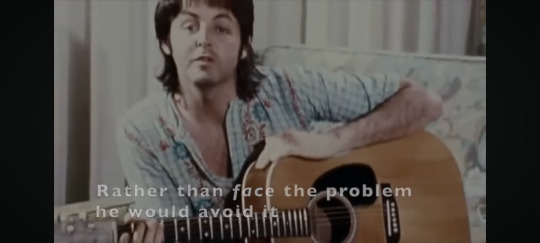
“She loves you and he loves him and they love each other”. You know when you've got something to say but you don't want it to look like you really wanted to say it specifically so you throw it in between two other things? No? Just me and John?
I'm obsessed with John just heaping praise on Paul in this interview. Every song the interviewer brings up it's “best” “my favorite” “all Paul” “good piece of work” “somewhere I have the tape of him doing it” “damn good” “one of his masterpieces” See also: Paul’s a good lyricist, he just doesn't try because he's insecure. And: one of the most innovative bass players of all time.
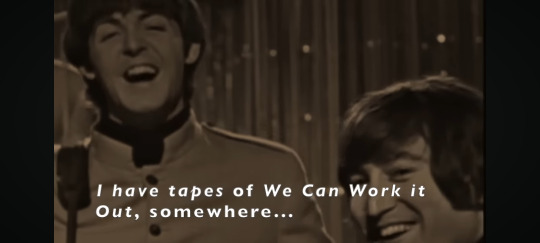
John mixing up In My Life and If I Fell “although I don't know why I'm confusing them, they're nothing alike but they have the same–” The same what? Same target? Same muse? Hmm? “It's really about–it's not about Cyn.” He's barely hanging on to not saying it here, like, by a gossamer thread.
John confessing that the consistent character flaw of Paul's which hurt him ((hurt. Not annoyed. Not angered. Hurt.)) was insensitivity. Not bossiness or lameness or sneakiness. Insensitivity. What John couldn't handle in the end about Paul was that he wasn't aware enough of John's tender feelings.
He's also so cruel in this interview. And what you've got to pay attention to is the theme connecting the songs he's cruel about: Let It Be (let John go) and The Long and Winding Road (the long and pointless fight).

The Japanese Monk comparison doesn't quite land for me because it implies that John purposely broke up the Beatles because he knew they were at a peak and he wanted them to stay gold. And I think that's what John would like the story to be. It makes him feel better inside. It makes him look incredibly wise and courageous. But it's clear – John even stated it himself more than once on record – that the breakup was not purposeful or calculated. It was a terrible accident that nobody wanted, least of all John.
More quotes to live by when examining John's post breakup “ow!”
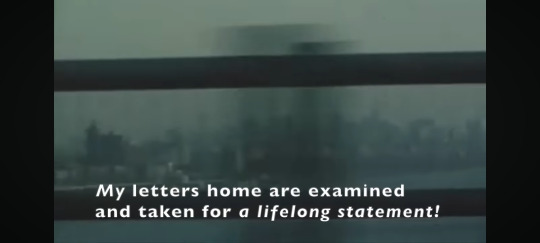

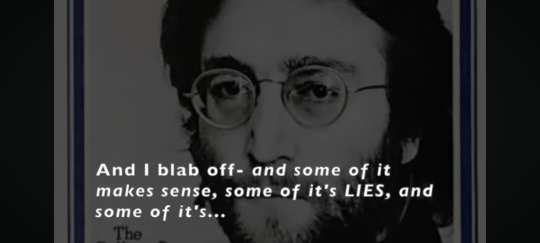
I find it fascinating that John thought of Paul's and Dylan's lyrics as very similar and says so twice in this documentary. But nobody else ever draws that comparison. In mainstream thought, Bob Dylan is one of the greatest lyricists of all time if not the greatest (it's me. I'm mainstream. Subterranean Homesick Blues my absolute beloved.) and Paul is the worst lyricist to ever get successful. And you know what? I think Paul gets punished for being physically pretty and financially savvy, and I think in the exact same way his music gets punished for being melodically pretty and commercially successful.
John about Paul's inscrutable messages in his songs: if one knows the person, one knows what's coming down. John in I Know (I Know): and I know. What's coming down.
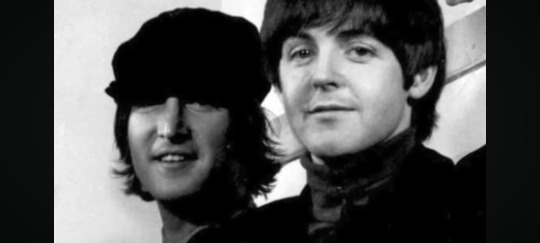
I will always love how he says in the same breath . . . “I've compared it to a marriage a million times" and "Paul and I were together.”
You really do gotta be like “Johns say the darndest things sometimes.” I mean that's what Paul did, right? Because genuinely most of the time he's a fucking sweetheart. After he's sat there defending Paul's insane mourning bus movie, the interviewer asks him to compare himself and Paul. And after saying there's never been a question about commerciality, he says this.
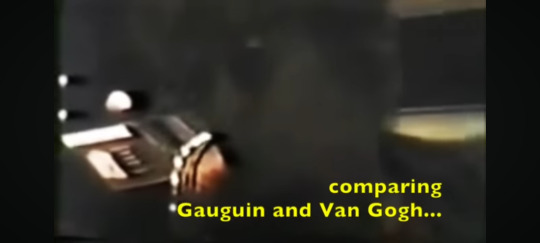
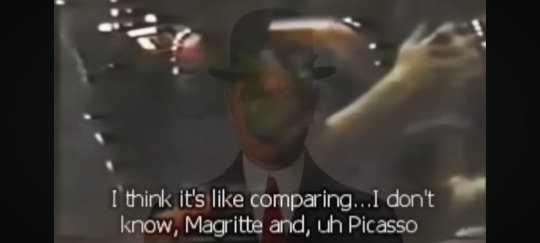
Nobody think about Paul writing “One of These Days” just before John's death then “This One” a decade later. Don't do it. I do recommend.
Free as a Bird is such a beautiful song. It's a gorgeous melody, and it's got such complex emotions. He's still mourning something that was lost, but he's hopeful. He's on his way home.
You all know that long distance interview Paul did right before John died where they bring up some of the awful things John said recently about him (ignoring the millions of loving and admiring things). When Paul's voice cracks and he looks up at the ceiling and struggles for a minute and the lights go out, I have a theory that it's one of their kids being protective. She was messing with the lights before to be silly and then when the bad question comes she turns them off again as a sort of protective sabotage.
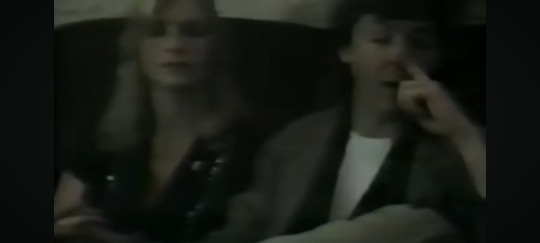
What If though? What If that's true?
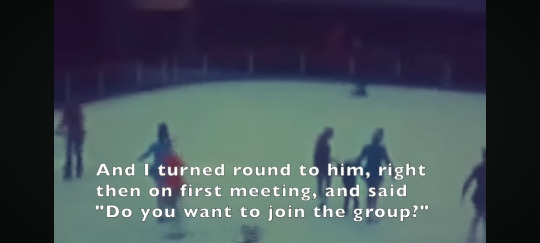
Quote of all time!!! “The person I actually picked as my partner, who I recognized has talent and who I could get on with, was Paul.” He doesn't say ‘as my sidekick’ or ‘running mate’ or ‘captain’s mate’ or ‘second string’ or any of those things that traditional Beatles fans tend to push on them. Partner.
Serious question, because I swing all over the place as to what I think actually happened between John and Paul physically and emotionally. If we agree that Real Love is about Paul (a baby and another on the way lalalalalala farm . . . Just call him on the phone) Then what about this lyric? “Was I just dreaming (a word of theirs and something they thought they shared) or was it only Yesterday (Paul's biggest song) I used to hold you in my arms? Is that to be taken literally? John used to hold Paul in his arms? i.e. frequent hugging and cuddling?
The heart monitor cuts so harshly into John singing “Grow Old With Me.” As we see beautiful images of John and all the people he's leaving behind. I'm dry heaving. This documentary is so much more painful this time around than the first.
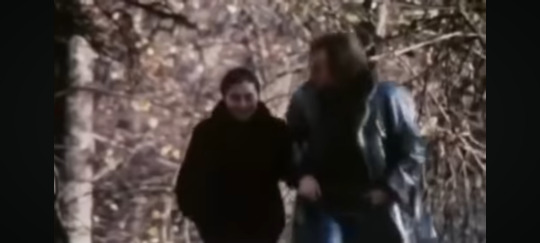



Anyway I'm glad we got coverage of all the “for Paul” songs. Which. Btw fuck you Sean and Peter. You proved absolutely nothing.
120 notes
·
View notes
Text
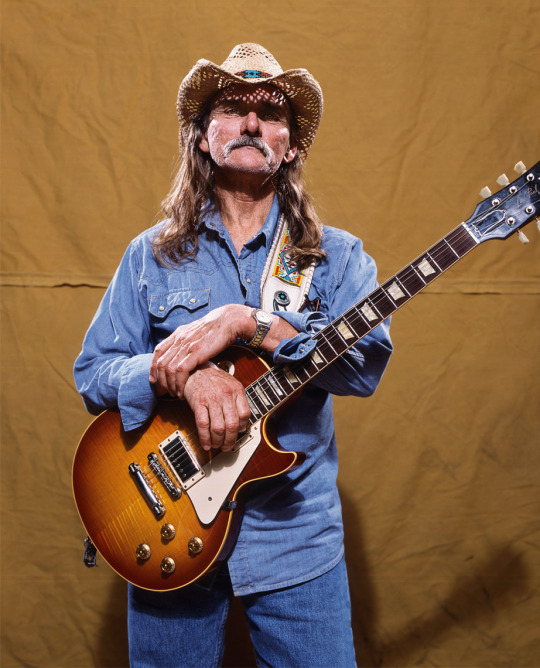
Dickey Betts
Guitarist, singer and founding member of the Allman Brothers Band best known for writing their 1973 hit Ramblin’ Man
Dickey Betts, who has died aged 80, was a founder member of the Allman Brothers Band, one of the most influential US “southern rock” groups of the 1970s. The hard-living outfit blazed out of Jacksonville, Florida, in 1969 with a mix of rock, blues, country and jazz that defined the genre, also influencing artists such as Lynyrd Skynyrd, ZZ Top, the Black Crowes and Kid Rock. They scored several platinum and gold albums and were inducted into the Rock & Roll Hall of Fame.
Although the six-piece band was ostensibly led by the blond- haired Allman brothers, Duane and Gregg (guitar and keyboards/vocals respectively), as joint lead guitarist, singer and main songwriter Betts played a crucial role. A larger than life character with his cowboy hats, long moustache and gunslinger good looks, Betts wrote many of the band’s best loved songs, including Jessica, Blue Sky and the 1973 US No 2 smash Ramblin’ Man, inspired by life on the road.
The signature duelling of Betts’s and Duane Allman’s lead guitars rewrote the rule book of how twin guitarists play together - previously one had played lead and the other rhythm. The band’s huge fanbase included President Jimmy Carter, and in 2020 Betts even received the rare accolade of a mention in a Bob Dylan song, when Murder Most Foul contained the line “Play Oscar Peterson, play Stan Getz/Play Blue Sky, play Dickey Betts.”
He was also the inspiration for the rock star character played by Billy Crudup in the former rock journalist Cameron Crowe’s film Almost Famous (2000), the director having been drawn to Betts’s aura of “possible danger and playful recklessness behind his eyes”.
Betts was born in West Palm Beach, Florida, one of the three children of Harold, a carpenter, and his wife, Sarah (nee Brinson), who wrote poetry and played the cornet in a Salvation Army band. Although his father was also a keen fiddler, Dickey’s first instrument was the ukelele, which he started playing aged five, later graduating to the mandolin and the banjo.
He was at West Gate elementary school when he wrote his first song, Seven Years With Pamela, about his sister. He then attended various West Palm Beach schools until seventh grade, dropping out of high school when he was 16, by which time his pursuits included carpentry, hunting and listening to the Grand Ole Opry on the family radio.
Hearing Chuck Berry’s Maybellene in his mid-teens prompted another switch of instrument, as he “started realising that girls like guitars”. He dropped out of high school aged 16 to tour the US with a travelling circus in his first band, the Swinging Saints, but was playing in Second Coming with the bassist Berry Oakley when Duane Allman invited both men to join his new group.
The lineup was completed by the drummer Butch Trucks and – unusually in white-dominated 60s southern rock - a black second drummer, James Lee Johnson, who had previously played with Otis Redding and Percy Sledge.
Although sales of their first two albums were sluggish, Duane Allman’s appearance on Eric Clapton’s 1970 album Layla and Other Assorted Love Songs – which included the classic hit Layla – boosted the heavy-touring Allman Brothers Band’s rising profile. Their 1971 live album At Fillmore East sold 1m copies.
After Duane Allman and Oakley were killed in motorcycle accidents in 1971 and 1972 respectively, Betts led a rejigged lineup. The 1973 album Brothers and Sisters – featuring Ramblin’ Man and the instrumental Jessica, later the theme to the television motoring show Top Gear – topped the US charts for five weeks, while 1975’s Win, Lose Or Draw went into the Top five. By then the band were succumbing to a familiar music industry cocktail of success, drugs, alcohol and feuding.
Betts and Gregg Allman both made solo albums, before Betts felt betrayed when the latter testified against the band’s road manager in a 1976 drugs case and refused to work with him again. Nevertheless, they regrouped in 1978, splitting again in 1982.
A second comeback in 1989 proved more enduring, although in 2000 Betts was fired over his drinking. That third spell in the band had been dogged by alcohol and drug abuse, lawsuits and arrests, and in 1996 he was charged with aggravated domestic assault after pointing a handgun at his fifth wife, Donna (nee Stearns), whom he had married in 1989. The charges were dropped after Betts agreed to enter rehab.
In his later years he returned with his own Dickey Betts Band and played in the band Great Southern with his son Duane. True to his ramblin’ man credentials, he remained on the road to the last, even after brain surgery following a 2018 fall at home, and he released live albums well into his 70s.
He is survived by Donna and his children, Kimberly, Christy, Jessica and Duane.
🔔 Forrest Richard Betts, musician, singer and songwriter, born 12 December 1943; died 18 April 2024
Daily inspiration. Discover more photos at Just for Books…?
13 notes
·
View notes
Text
mack-anthology-of-noise -> mack-anthology-mp3 -> mackmp3
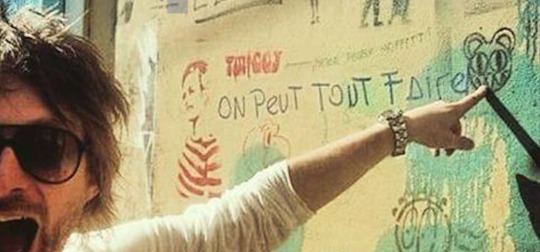
hello i'm mack :D
welcome to my blog it is terrible!
here i post about. things. that appear in my mind. and exit it in tumblr form. mostly music and art related! (hopefully)
i am a lesbian (possibly aspec not sure), she/he (they is okay if you forget). i am also butch! boydyke and vaugley leaning transmasc but also not quite. boy in a girl way. or something <3
i am a teenager still! so please don't be weird yknow. i'm from aotearoa new zealand and am pākeha (white)
i am a musician! i play bass, guitar and sing in descending order of proficiency hehe. i can also do harmonica, thank you folk music phase, and i'll attempt piano. i write songs too! all audio recordings are under #musicking , hopefully they are cool :)
i also draw and paint! at the moment A Lot of it is of doctor who characters, so check out my other blog for that (linked further down), but all of other stuff is tagged under #my art ! i have actually improved quite a bit recently i think which is nice
i'm not really comfortable with dms but if you'd like to say hi or talk about / rec some music or just tell me something, please send an ask! I would love to hear from you! (if you've sent me a dm pls don't stress about it, i'd just rather not talk privately, thank you for your consideration)
it would be great if i wasn't followed by adults! for my purposes this is 21+ but this is at my discretion, i intend no offense if i block you <3 also like. please no bigots. thanks. if you're going to hate on people then please at least do it somewhere else
my music i am normal about
pj harvey // radiohead // patti smith // joan baez // bob dylan <- my top five ever. i think. maybe. subject to change.
post punk // industrial // 90s indie // shoegaze // 60s & 70s folk & folk rock // garage rock // psychedelica // goth // dunedin sound // new wave // no wave // electronic
currently listening to dunedin sound music and A Lot of placebo
pleaseeeeee talk to me about music i can and will make you a playlist on any vibe if you would like <3
media, my bestest friend stories
doctor who has taken over my mind! if you want to see generally mildly unhinged thoughts about the show & random bits of the eu & 1271927 art reblogs i will direct you to @lost-tardis-room which is 90% doctor who atm hehe. i put my fanart there too.
you can look at my letterboxd if you so desire but i will admit i don't watch nearly as many films as i would like
the starless sea (favouritest book ever) // we have always lived in the castle // this is how you lose the time war // salt lick // neverwhere //m train (any of patti smith's books honestly) // bob dylan's chronicles // vampire science
the sideblog is @mack-the-sequel for stuff that's not as on theme - if we're mutuals feel free to follow that! i mean anyone can follow it if you like but don't expect quality content lol
64 notes
·
View notes
Text
this article is NOT good btw it feelslike an essay written by a middle schooler but thank you yuppppp this is what i mean when i say he writes explicitly about homosexuality im not being facetious clearly he is purposely writing about homosexuality thank youu and im telling you i could think forever about his work as part of a gay schema like all the different gay artists that he clearly draws from and how that affects his work and basically look how obsessed he is with ginsberg and rimbaud..do you think thats regular? tho i hate the use of "queer" and i hate when articles like this have to preface with some bs like "tho not queer himself..." wtf why are you making a statement like that why do you feel so compelled to label him as just an outside observer or really as anything at all? bold as hell if you ask me but you know im mister Bob dylan gay. but anyway did you ask him?
17 notes
·
View notes
Text
I noticed people creating such descriptions on Tumblr, I assumed that I could do the same so that the people who visit my blog would be less confused about what they're seeing here. After all, I'm really open to communication, but it's probably better if you know what to expect from me:)
So, who the h am I?
> Obviously, Ohiko Amok is not my real name. Not only do I have Eastern/Central European origins, nobody can have a surname which stands for an aggressive dissociative behavioral syndrome (i guess).
I don't want to go by my real name on the internet unless it comes up in conversation with my mutuals.
> I'm a person of many professions: (1) personal tutor teaching adults with dyslexia, adhd, Asperger's etc.; to speak English (2) Marketing professional; (3) Graphic designer; (4) Apparently, I become an HR manager as well???
Sometimes I post some funny observations connected with my professional background, and even though some of them might seem tiny bit salty, I love my occupations wholeheartedly (except for some episodes of working with people, people are truly annoying sometimes).
> I have lots of hobbies; I like cooking (I'll gladly exchange recipes with anyone interested in mine), I like painting and drawing (both digitally and traditionally), I do yoga, I like reading (and sometimes even writing) and I like learning about skin issues (lol, I even have a certificate that I finished a course teaching about acne and how to properly deal with it xd). I also play a number of very simple computer games and enjoy board games, but I wouldn't call myself an enthusiast of neither. What I do adore is music - I'm the only person in my family who haven't had any musical trainings in the past, but being a daughter of a choir singer and a guy whose friends call him "Orchestra" for playing multiple instruments, together with being a sister of a sound designer and a former rock band frontman, I do have a strong appreciation for music. My taste in music is very vast and it'll be difficult to limit it to one genre or a group of artists, but I can easily name some of the most influential performers for me: Bob Dylan, Joan Baez, Leonard Cohen, Dusty Springfield, Judy Garland, Fleetwood Mac, Czesław Niemen, Marek Grechuta, Volodymyr Ivasyuk, Okean Elzy, Skryabin..
I would love to bond over music with anyone with similar tastes <3
I also absolutely ADORE cats, they are my "spirit animals", so they are going to appear in my blog sometimes.
> I do not identify myself through pronouns, sexuality, belonging to a certain movement. I think all of those labels are secondary and often limit person to a certain degree. Biologically, I'm a woman. I'm bisexual, but I do not consider myself to be a part of LGBTQ community. I'm not religious. I'm not a feminist of any kind. I have my own strong ideas developed through the years living in a certain context, my own preferences and worldview, but I don't want to label them in any way, as it seems redundant.
> I come from Poland<3 If at some point you might get confused by my posts' being inspired by both Polish and Ukrainian popular culture and historical background, it's because I was born in Ukraine (albeit in a Polish family) and feel a strong connection and love to both countries.
> Since I've started to post on Tumblr regularly, I very often get some horny messages (i'm talking about real people, not porn bots), so here's one bit of information which I feel obliged to add to my account description: I'm currently engaged and I'm not looking for any relationships aside from friendly ones
> I don't reply to messages in russian
Cheers, if you've managed to read this whole post, I hope you'll enjoy the content I post on this account<3 Feel free to ask any questions that might come to your mind, I really like talking xd
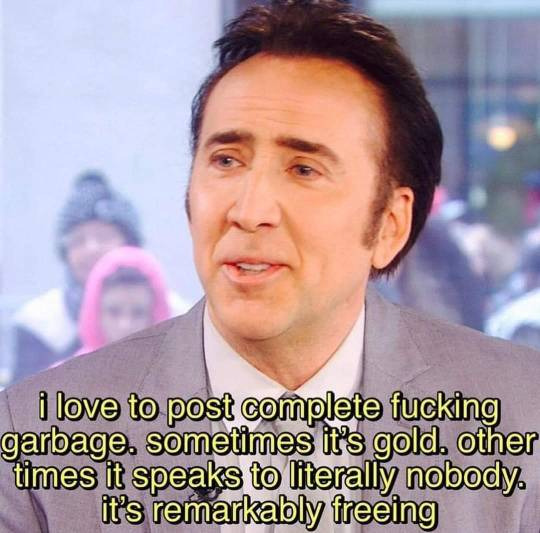
15 notes
·
View notes
Note
I just know that if TS wasn’t a white woman no one would praise her mid music, and would make fun of her bad lyrics to no end, I could tolerate the songs a bit more of they stopped praising it like it was Bob Dylan/ Nina Simone level of lyricism and musicality, is just simply pop music that they over analyse and give such “profound” meanings that they believe TS intended (very cultish vibes tbh), is very tiring to be told I’m a misogynistic woman just because I can see is not objectively genius material, I’m not saying you HAVE to dislike it, but acting like is the best music ever recorded is just delusional at this point, when is just okay and sometimes bad (those “Karma” lyrics… that’s not good)
THIS
because if they just acknowledged that it’s just okay, sometimes good, but not the best music of all time, it would be so much less annoying. to claim “draw the cat eye sharp enough to kill a man” and “karma is my boyfriend” are award winning style lyricism is just absurd. you can find it good or not annoying if that’s just what you’re into, but it’s nothing to actually write home about.
13 notes
·
View notes
Text
Dollar Bin #21:
Paul Simon's There Goes Rhymin' Simon

When I was little my mother loved to brag about how ugly I'd been as a baby.
"He looked just like a frog," she'd tell her friends while I stood about, often with my finger deep in a nostril. There was always love in her eyes when she said it, but looking back on the photos, I'd say she was putting a positive spin on things. Frogs are, after all, fairly cute.
And so, when my own children were about to be launched into existence I felt fairly excited. Would they look like aged dwarves/me or cosmic goddesses/my wife? Sadly, they all were angelic and beatific, and wound up smart and kind as well, which makes them fairly boring to write about.
So, forget about them. Let's talk instead about one of the ugliest record covers in my entire collection. There's plenty of grossness to report on...
If you want sheer trashiness, cast a terrified eye upon Neil Young's American Stars and Bars. It's ugly on a number of fronts: first, we've got a directly vertical, up from a glass floor, vantage point of Young's plastered and pressed face; work in the barmaid's ridiculous unmentionables and take note that my own 99 cent version is ripped to shreds, and you've got a contender for the ugliest record of all time.

But the vinyl inside is pristine and the album features two of the best songs of all time back to back (Like a Hurricane and Will to Love, of course), so who cares: ugly is awesome in the Dollar Bin.
And then there's Fairport Convention's Live at L.A. Troubadour which is famously horrifying to gaze upon. The art department at Island Records either hated the band, or themselves, or the whole planet. As dedicated Dollar Binners can tell you, my own coveted copy is also slightly melted so its ugliness knows no bounds.

And no ugly cover contest is complete without mentioning Dylan, the infamous Screw You Bob! record of outtakes Columbia put out when Bob jumped ship in 73 for Asylum Records. The only thing uglier than the portrait on the cover is Dylan's cover of Big Yellow Taxi.
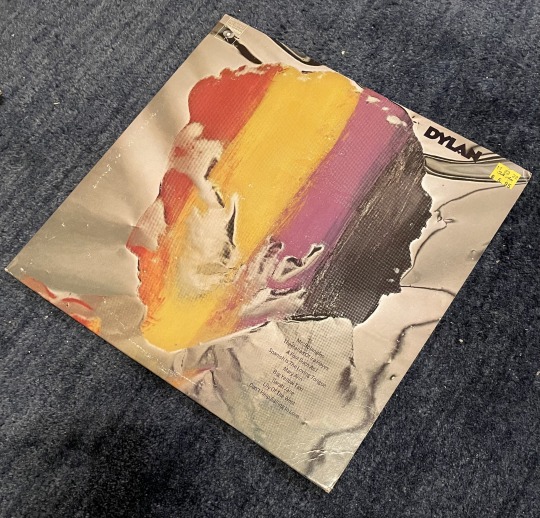
(But don't buy the hype that Dylan is terrible; in spite of Columbia's best efforts to end the Bobster's career, the album contains a few great tracks; but that discussion will have to wait for Dollar Bin #642, or maybe #643. That's right: I've got the next 64 years of this nonsense already planned out...).
I could go on and on (we haven't even touched on the giant weird stylus phallus on the cover of The Bunch...). My personal Dollar Bin is chock full of unsightly greatness.
But, without further adieu, let me submit for your very personal consideration what is arguably the greatest ugly record of all time: Paul Simon's There Goes Rhymin' Simon.
Behold the horrifying cover art concept: every track on the album gets its own infantile piece of pop art horror somewhere on the gatefold. Mingled in are an archival photo of teenybopper Simon with a full head of hair and another photo of daddy Simon with a full head of combed over hair.
The Dollar Bin teems with copies of this record; everyone, and their weird uncle, bought a copy of Rhymin' Simon in 73 because the music within it is awesome, but they, or their grandkids who inherited the collection, just couldn't bear to look at the insidious cover and therefore eventually pawned it off on dollar bins the world over. If you don't own a copy, get a life and go get it. Put it on your turntable but don't look at the cover; like Medusa's visage, it may turn you to stone. And I like you just the way you are: unstoney.
Indeed, I'd argue that There Goes Rhymin Simon is proof positive that most people in these troubled times are more focused on how their record collection looks on the shelf than how it sounds. You know 'em: they've got Steely Dan albums enshrined in plastic and they can't wait to show you their minty copy of The Wall. Yuck. Lend me a ruler and I'll draw you some bricks, if you really want to see some, but I won't force you to listen to Roger Waters drone on and on about his own hideous meaning of life.
I was deep in a dollar bin recently, knees aching on the floor, when two college kids came in, asking for directions to the Yes records. They very clearly did not own a record player; rather they wanted Yes to grace their dorm room walls. Indeed, that's probably the sole reason anyone on earth has ever had for owning a Yes record. I've never owned one, and I never will. I declare Hell No to Yes.
Only a masochist would mount Rhymin' Simon on their wall. Who, you ask, do we have to blame for undercutting the fourth masterpiece of Simon's career (The first three are Bookends, Bridge Over Troubled Water and Paul Simon) with such shoddy pop art? The answer is none other than Milton Glaser, the guy who foisted the following on us all:

Imagine the greatest, most recognized thing in your entire life taking you six seconds to create and being something a fourth grader could come up with. I heart NY to, but I mean Neil Young when I say so; why isn't anyone offering me a solo show at the Pompidou Center?
Glaser could have designed a plain brown paper bag to hold Simon's record, then slipped a fresh cow pie in alongside it and thereby have done Simon an immeasurably better turn in the art department.
Before you accuse me of just being ignorant about modern art let me offer the defense that I actually took a course in modern art at Cambridge for a term which led to religious experiences in front of Rothkos and Chagalls. Furthermore, Glaser has made some wonderful art in his career. Consider Dylan's psychedelic hairdo:
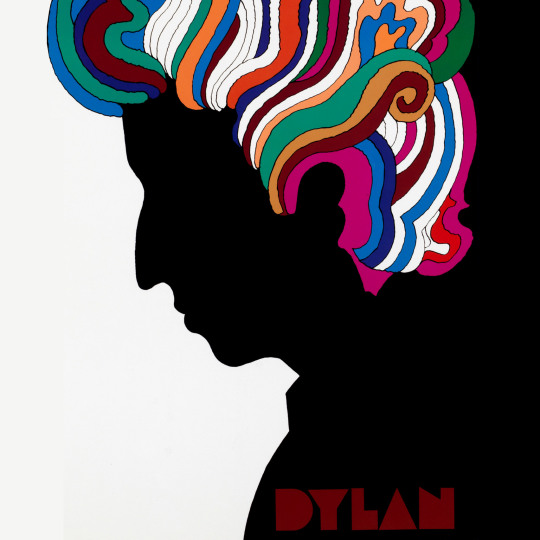
I'm guessing that Simon finished Rhymin' and then ordered Glaser to give him the Dylan treatment on his cover. But Glaser took one look at Simon's hair and said, "Paul we're going with ugly rather than comb over with this one," then turned out Rhymin's abomination. Simon learned his lesson: every one of his album covers since then has either featured tasteful art or a photo of Paul with a hat or hairpiece carefully in place.
It's tempting to think of Rhymin' as Simon's own version of Chrome Dreams, Neil Young's abandoned (but recently released) 70's album of masterful individual songs. Almost every track on Chrome Dreams comes from a separate recording session and every song stands on its own, seemingly unrelated to its neighboring tracks. Like the eclectic stops on Odysseus's journey home, both Rhymin' and Chrome Dreams can be experienced as a series of only vaguely related adventures. There's plenty of terror from Polyphemus cave to be witnessed on each record, just like there's a lot of lust to be had in Circe's bed.
Glaser's juvenile and segregated artistic approach on Rhymin' only strengthens this sense. What does a cheap, jaundiced Mardi Gras mask possibly have in common with equally cheap, inverted dollhouse chairs? And what's with the terrifying heart-pupiled eye? Can't we ask Odysseus to ram a spike into it or something?
But on close listen, Rhymin' finds cohesion, its greatness unfolding around us as we sail narrow straights between the Scylla of 70's pop schmaltz the Charybdis of cultural appropriation.
Let's start on the Scylla side, shall we? Simon can sound saccharine on occasion. Songs like Why Don't You Write Me and The Big Bright Green Pleasure Machine sound like byproducts of a men's retreat with Stephen Stills and Paul Anka. Everyone ate whipped cream out of tubs, compared biceps and combed their chest hair with care.
The album opens in these Scylla infested waters with Kodachrome, an almost too perfect pop number which, if taken a step further, would sound like a Chicago song. But Simon adds kick to the mix, enunciates the word "crap" with aplomb, and chides his ego whilst among the ladies. And so the whole thing rolls nicely: when this number comes up on FM radio, you'll hum along.
Other moments when he dodges the six heads of schmaltz include Quincy Jones' feathered pillow arrangement on Something So Right and the overall daddyrific vibes of Saint Judy's Comet. But both of these songs are masterpieces lyrically and melodically; we lean into the schmaltz because everything about the songs is indeed so very right.
youtube
I'm pretty convinced Dylan listened to Something So Right with great care before wrestling, over and over again, with You're a Big Girl Now a year later. Simon famously told Dylan in the mid sixties that he liked the rough sketch of a song Dylan had just cut in the studio. Paul encouraged Bob to take his time and build the track up into something great. Dylan responded by saying that the single rough take would be the only take; he had bigger fish to fry. The story is cute, but not altogether accurate; after all there's about 4000 studio takes of Like a Rolling Stone. And by 74 Bob gave Simon's perfectionist approach an even more earnest try. Thank god he did.
youtube
Listen for the organ to come soaring in, landing on the fence of Dylan's soundscape like a precious bird of flight. Am I wrong to think that this glorious track is a fitting cousin to Something So Right?
Okay, that covers the schmaltz. But the awkward whirlpool of cultural appropriation has also been a hazard in Simon's career and he narrowly dodges a few Charybdis sized abysses on Rhymin'. Three years after going full karaoke on El Condor Pasa he swims his way through two slightly cringy, I Wanna Be Black, soul numbers on Rhymin': Tenderness and Loves Me Like a Rock. Both come with the full support of The Dixie Hummingbirds. I'm even whiter than Simon so I can't comment with any authority on the ethics of Simon taking the lead while these great Black artists support him.
But I can tell you that I love both songs, especially Tenderness, and that Simon did a lot more than any other white artists of his generation to promote and give credit to the artists of color he worshiped and leaned on. He took the Peruvian band responsible for El Condor Pasa, Urubamba, as well as the Jessy Dixon Singers, on tour with him after this record, and both groups are featured with prominent respect on his subsequent live album (Live Rhymin' is another Dollar Bin classic and another significant entry in the ugly cover contest).
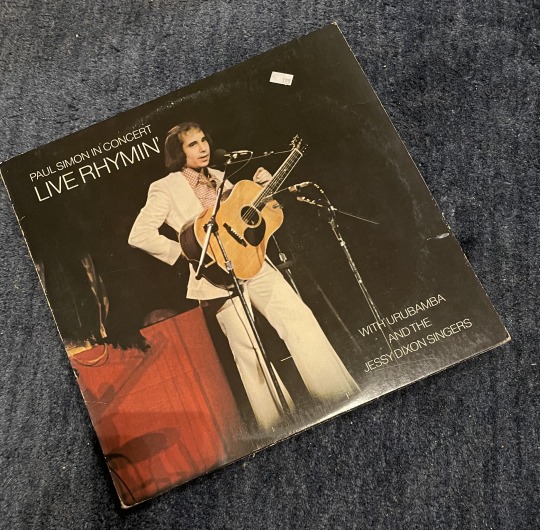
And we all know how Simon earnestly introduced American audiences to Brazilian and African artists in the 80's. Simon's career may be built on a good deal of appropriation, but it seems to me that he always tries to do it with respect. After all, he treats Aretha Franklin's version of Bridge over Troubled Water as the song's authoritative take.
But I'm not sure that even all those qualifiers can rectify the soft reggae vibes of the Rhymin' track Was A Sunny Day. If it's okay with you, let's give Simon a pass there, as the song does feature the vinyl debut of The Roches.
Alongside these skillful schmaltz and appropriation dodges Rhymin' also features a few straight up Paul Simon classics. Take Me to the Mardi Gras, One Man's Ceiling, Learn How to Fall and America Tune: these are beautiful songs from start to finish, each of them simple and incredibly complex all at once. Simon has the uncanny ability to turn easy listening into high art and there's a dark turn to be found in each song if you lean in. Listen to the Reverend Claude Jeter sing the glowing, devout bridge on Mardi Gras; worry about who's doing what behind Simon's building in Ceiling; count the impossible number of balanced harmonizing parts in Fall; and, most of all, take a moment to appreciate the towering greatness of American Tune.
youtube
As a teenager I saw Simon twice on the Rhythm of the Saints tour. Everything was dense, earnest and slick. But when Simon came out alone, in midst of the First Gulf War, and sang American Tune I got my first real taste of true patriotism: Simon loves his country enough to criticize it through earnest, complex and open-ended metaphor. I'd say he did the same thing on the tenth anniversary of 9/11 as well:
youtube
I don't care how little hair he has, and I don't care what his albums look like. Paul Simon is a Dollar Bin genius, an old friend who's still standing with us as we watch the Statue of Liberty sail away to sea. I sure hope we can come together and reel it back in.
Happy November everyone.
#milton glaser#paul simon#neil young#bob dylan#stephen stills still sucks#Youtube#fairport convention
7 notes
·
View notes
Text
How Many Roads?
In BDSM, the journey of a new dominant is often riddled with challenges, misconceptions, and conflicting advice. Just like Bob Dylan's song Blowing in the Wind asks this timeless question, "How many roads must a man walk down, before you call him a man?" in the BDSM community, one might ponder, "How many roads must a dominant walk down before you call them a dom?" Unfortunately, the internet is filled with misguided notions of what constitutes a "real" or "true" dominant, leading many newcomers astray.
Drawing from personal experience, some have shared various and unique logic that questioned the authenticity of my dominance. Among these reasons, the absence of a beard seems to perplex certain individuals, as if resembling a cast member of the Duck Dynasty were a prerequisite for dominance. Additionally, the act of writing poetry has been met with disdain; some assert that a dominant should not dare to express emotions and vulnerabilities, let alone through such a medium. There is a notion that writing verse is unmanly, and therefore, it is undomly. Furthermore, the choice to maintain numerous and close vanilla friendships has raised eyebrows, as if the world of BDSM demands exclusive devotion and shuns any connection to the broader spectrum of human relationships. However, the richness of life lies in its diversity, and embracing one's multifaceted identity is not only permissible but essential in navigating the complexities of dominance and submission.
Despite the skewed logic and misconceptions encountered by dominants navigating the BDSM landscape, there exist fundamental commonalities among practitioners of the lifestyle. These shared principles transcend superficial expectations and stereotypes, forming the backbone of healthy BDSM dynamics.
Communication stands as the cornerstone of effective BDSM dynamics. It is the bedrock upon which trust, respect, and mutual understanding are built. A dominant must possess the ability to clearly articulate desires, boundaries, and expectations, ensuring that both parties are fully informed and consenting to any activities. This communication extends beyond the confines of individual scenes, permeating every aspect of the relationship. Active listening is equally important, as it allows the dominant to understand their submissive partner's needs, concerns, and desires, fostering a deeper connection and facilitating the negotiation of boundaries. Ongoing discussions about needs, concerns, and desires are essential for maintaining a healthy and fulfilling dynamic, ensuring that both parties feel heard, valued, and respected. In essence, effective communication is not just a skill but a fundamental principle that underpins the entire BDSM experience, enriching the dynamic and promoting trust and intimacy between partners.
Trust serves as the cornerstone of any BDSM relationship, acting as the bedrock upon which the entire dynamic is built. For a dominant, earning the trust of their submissive is paramount and requires a commitment to consistency, honesty, and reliability. Consistency in behavior and actions helps establish predictability and stability within the relationship, fostering a sense of security for the submissive. Honesty ensures transparent communication, allowing both parties to express their needs, desires, and boundaries openly. Meanwhile, reliability underscores the importance of being dependable and accountable, honoring commitments and agreements made within the dynamic. This foundation of trust not only strengthens the bond between dominant and submissive but also facilitates the smooth functioning of power exchange dynamics, enabling both partners to explore and fulfill their respective roles with confidence and mutual respect.
Respect is a cornerstone of BDSM dynamics, serving as a non-negotiable principle essential for fostering trust and harmony within power exchange relationships. Dominants are tasked with demonstrating unwavering respect for their submissives' autonomy, boundaries, and overall well-being. This entails honoring their limits, preferences, and consent at all times, thereby creating a safe and consensual space for exploration. Similarly, submissives are expected to reciprocate this respect by acknowledging and honoring the authority and boundaries set forth by their dominants. By upholding mutual respect, dominants and submissives cultivate a foundation of trust and understanding, laying the groundwork for fulfilling and enriching BDSM dynamics.
Consent stands as a pillar of BDSM dynamics, transcending all roles within the community. It is not only essential but mandatory in any form of BDSM play. Consent entails an explicit, enthusiastic agreement to engage in specific activities, with the understanding that it can be revoked at any moment. A dominant prioritizes informed consent above all else, never resorting to coercion or manipulation to attain compliance from their partner. This unwavering commitment to respecting boundaries fosters trust and mutual respect within the dynamic.
Continuous learning and growth are integral aspects of the lifestyle journey, constituting a profound exploration of self-discovery and personal development. A dominant recognizes the inherent complexity of human interactions and power dynamics, understanding that mastery in BDSM is an ongoing process rather than a destination. They humbly acknowledge that they do not have all the answers and remain receptive to learning from a multitude of sources: from their own experiences and mistakes to the diverse perspectives of fellow practitioners within the community. This openness to new insights and perspectives cultivates a deeper understanding of oneself, allowing the dominant to confront and transcend personal limitations. Through introspection and self-reflection, they refine their communication skills, deepen their emotional intelligence, and refine their ability to navigate the intricate nuances of power exchange dynamics. This commitment to continuous growth not only enriches the dominant's journey but also enhances their capabilities as a leader and guide within the BDSM dynamic, fostering healthier and more fulfilling relationships with their submissive partners.
Embracing individuality within the realm of BDSM is paramount to fostering authentic and fulfilling dynamics. There exists no singular template for dominance, as each practitioner brings forth a tapestry of distinctive traits and inclinations to their role. Whether adorned with a beard or not, expressing emotions through poetry, or maintaining vanilla friendships alongside BDSM relationships, these facets of identity serve not as detractors but as enriching elements to the dominant persona. Embracing one's uniqueness enhances the depth and authenticity of the dynamic, infusing it with a richness that stems from genuine self-expression. By acknowledging and celebrating the multifaceted nature of one's identity, dominants can navigate the complexities of power exchange relationships with confidence and integrity, forging connections that resonate on a deeply personal level.
In essence, being dominant is not about conforming to preconceived notions or adhering to superficial standards. It is about embodying the core principles of BDSM while authentically expressing oneself. As newcomers navigate the complexities of the lifestyle, they should disregard the notion of a "true" dominant and instead focus on cultivating a deep understanding of themselves and their partners. There is no singular path to dominance, and embracing one's individuality is key to a fulfilling and authentic BDSM journey. So, ditch the notion of "twue" dominance, and embark on your path of growth, discovery, and self-expression within the vast and diverse world of BDSM.
If you enjoyed this, I invite you to give my podcast a listen 'Chatting With The Lightkeeper,' a top 25% most-followed podcasts on Spotify but available on all the major podcasting apps and follow my socials for more exclusive content: Instagram, Facebook, Bluesky, and X (formerly Twitter) for a deeper dive into the wonderful world of D/S.
As with all of my thoughts, please see this disclaimer.
©TLK2024
#bd/sm blog#bd/sm community#bd/sm daddy#bd/sm kink#bd/sm lifestyle#bd/sm relationship#d/s#d/s community#d/s relationship#dom/sub#my writing#my polls
5 notes
·
View notes
Text
Trying to decide if I should:
Work on my Satine Week fics
Work on my Obi Wan mini bang fic
Write and research my 3 seminar papers
Draw Chabadnik Din Djarin
Draw Bob Dylan as Commander Cody
#Bob Dylan Cody is currently what I’m leaning toward#even though that’s the least productive option#my seminar papers should probably take priority#but I’ve been reading early medieval biblical commentary all day there’s only so much of that a girl can take#grad student#grad school#grad school problems
2 notes
·
View notes
Text
Dylan & Springsteen
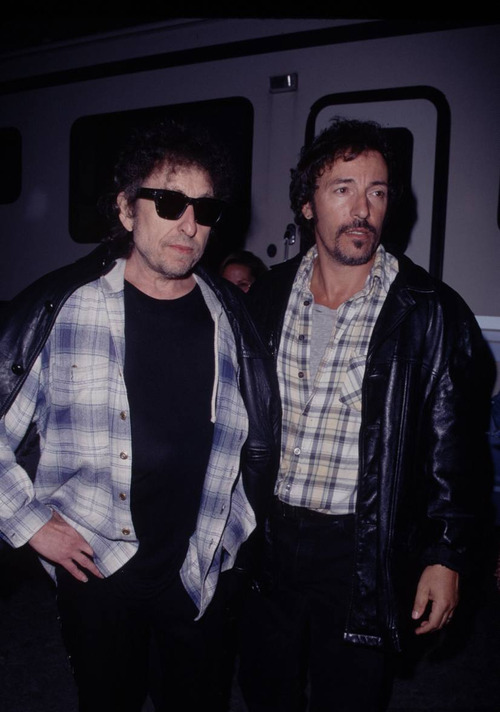
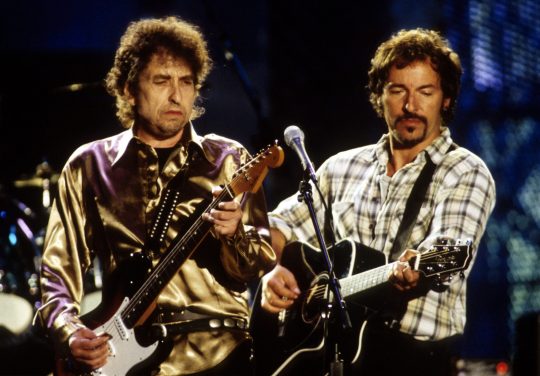
In Springsteen's book Born To Run, he recounts the time he met Bob Dylan during the Kennedy Center Honors.
"We were alone together for a brief moment walking down a back stairwell when he thanked me for being there and said, 'if there's anything I can ever do for you...' I thought, are you kidding me? and answered, 'It's already been done."
Springsteen had sung The Times They Are A-Changin.
He writes, "as a young musician, that's where I wanted to go. I wanted to be a voice that reflected experience and the world I lived in. So I knew in 1972 that to do this I would need to write very well and more individually than I had ever written before."
Springsteen started to write Greetings from Asbury Park, an album drawing from Bruce's personal experiences.
3 notes
·
View notes
Text
Get to Know Me!
This is just a fun little thing I’ve been wanting to do since the dawn of time but could never find a post to reblog that satisfied what I wanted. So I made this, feel free to reblog and use it yourself!

❤️ how tall are you? 5'5?
🧡 what is your sexuality? ------- there's your answer
💛 what is your favorite feature on yourself? Eyes?
💚 where are you from? Earth. Of that I'm certain
🩵 do you have any pets? A dog, and chickens
💙 do you have any siblings? 3 sissies
💜 describe yourself in five words or less! Quiet, loving, energetic, fantasizer, peaceful
🩷 dream job? Writer
🖤 favorite hobbies outside of your blog? Writing, reading, drawing, watching tv, walking
🎂 when is your birthday? Do you want the black market to find me?
🌙 your zodiac (Sun, Moon, Rising) I know it, I just don't want to share (kidnapper thing)
💉do you have tattoos and/or piercings? Ear piercing
🚗 can you drive? A bicycle
✈️ favorite place you’ve traveled. Its a place in Michigan called zender's I think
🎤 have you been to a concert? I want to... But no
🎵 favorite artists. The Beatles, one direction, Queen, Taylor Swift, the killers, bob Dylan, the Monkees, green day, Fleetwood Mac, led zeppelin. Niall horan.
🎧 last song you listened too... In my head by Jason Derulo.
📺 last show you watched.. One called northern exposure
📝 last thing you wrote. A song I started to write
🔐 something no one would guess about you. I secretly have a dirty mind
🧟♀️ scariest thing that’s happened to you. I went to get my dog out of a truck in the dark and I seen all these eyes staring at me.
🔥 craziest thing that’s ever happened to you. I've never actually told anyone about this, except my sister... But when the Crosby part of Crosby still and nash, (can't think of his name right now, lol) died, before I found out about his death I had A dream where me and my mom were cruising down the road , across A beautiful field of sunflowers, and the song playing on the radio was Southern cross... And I tell you what, when his death was announced I was like: "hang on a sec"!! biggest coincidence ever..
🍓 favorite food? Chocolate
🍅 least favorite food. Lima beans
🍊 favorite season? Hard to say, but I guess autumn
🍋 favorite genre to read / watch / write. Its a toss between comedy drama, period drama or dystopian
🍐 if you could make one character real, who would it be. Hard question, but probably Vincent Nigel Murray
🫐 some place you’d love to visit? London baby
🍇 a word your friends would use to describe you. Goofy
🍒 what is your earliest memory. Eating my first bologna sandwich
🍌 what is one talent you wish you had. Writing, lol
💌 why did you start this blog? There was great Beatles content
✏️ when did you start writing fanfic. I barely do, but when I was 14
🖇️ what are your favorite asks to answer.. I've never had any of these, not popular enough, lol
📚 how do you come up with the fics you write. Music, darling, music
📌 what is the fic you’re know for... None
🔍 what character do you enjoy writing for the most... Sherlock holmes Vincent Nigel-Murray
🖊️ what character do you not enjoy writing for. Idk
💔 is there a fic you wish you didn’t write.. Yes
❤️🔥 what character do you simp for most often.. Again, Vincent Nigel Murray
🧚♀️ favorite characters of all time. This will take a minute... Vincent Nigel Murray, Zack Addy, Phantom of the opera, finnick odair, Peeta mellark, temperance Brennan, katniss everdeen, haymitch Abernathy, Johanna mason, lance sweets, Sherlock Holmes, john watson, Louisa Clark, will trainor, Peter Parker, doctor strange, ant man, Mr. Darcy, Elizabeth Bennett, Henry Tilney, Emma Woodhouse, Mr. Knightley, joey tribbiani, Chandler bing, Phoebe buffay.
🪐 favorite shows / series of all time. Bones, monk, psych, Downton Abbey, the mentalist, Sherlock, Sherlock Holmes 1984, f.r.i.e.n.d.s, Golden girls, Emma 2009, north & south, the x files, twin peaks.. Book/movie series: hunger games!
🌝 a show you would recommend to anyone. all of the ones mentioned above
🌚 a show you’d tell people to stay away from. Idk yet
🌹 favorite kinks to write for. Idk
🥀 kinks you would never write for. Idk
🌊 a kink you would like to write but you think you’d be judged. Again, idk
❄️ full fics, imagines or head canons, can't tell you
☂️ your favorite fanfic from another writer, I have one but it's on another website

A couple of in depth questions!
🍄 what is something that’s happened in your life that you wish you could go back and change? My mean grandfather living with me
⭐️ what is one of your biggest accomplishments? Why is it so important to you? Being a nice person, speaks for itself.
🪻what is the toughest thing you had to go through, but can say you’ve successfully overcome? Death of my step grandfather
🌺 what is the best gift someone has ever given you and why is it so important. My mom gave me life?
🍀 what is your comfort show/series and why is it your comfort show? How has it helped you? The Monkees helped when my one grandfather died.
#Me#About me#get to know me#the beatles#one direction#queen#taylor swift#the killers#bob dylan#the monkees#green day#fleetwood mac#led zeppelin#niall horan#crosby stills nash and young#vincent nigel murray#zack addy#poto#finnick odair#peeta mellark#temperance brennan#katniss everdeen#haymitch abernathy#johanna mason#lance sweets#Sherlock Holmes#peter parker#jane austen#bones (2005)#joey tribbiani
2 notes
·
View notes
Note
Do the monkees ever get a full living wage off of being a band later in their life’s?
What are the Monkees favorite songs?
I know that Micky says gosharoonie a whole bunch, but do you have any other ideas for what he might say on the regular?
What are the monkees special interests?
Okay not really related to As We Go Along, but when even did they decide to get Mr. Snchider(the puppet due)?? Like it’s so random
If the monkees were in a modern setting, what would be their favorite artist?
Does Micky have a photo that he keeps if his dad?
Does Mike/Peter write to his parents?
Does Mike ever teach the other monkees how to sew?
Does Micky paint/draw like Mike?
How often to they dress up? Like all I can imagine is that they have a full closet of costumes for every possible occasion
I think as they get older and get more locally popular they definitely start getting good regular money! I think sometimes it's still kinda spotty off n on, but definitely livable :)
I think Peter's favorite song definitely has to be Expecting to fly by buffalo springfield:3 mike really likes house of the rising sun and like a rolling stone by bob dylan😋also all of johnny cashs discography. Micky really likes I've just seen a face by the Beatles! I think the whole album too has to be his favorite album. I honestly can't think of anything for davy . I think he likes carie anne by the hollies a lot 😋
I think Micky has tons of different phrases he repeats tbh. He's ALWAYS saying "he's kinda cute" about anyone
Peter has a special interest in philosophy and language! And I think music was mikes main big special interest. He kinda made his whole life about it
Honestly I think micky just pulled it from an old mysterious thrift store that quickly went out of business right afterwards. Mr. Schneider knows things and has seen things that none of the monkees could ever imagine or are even aware of. They dont even know he's sentient.
Mike would be into stuff like midwest emo and like,,,duster and radiohead n shit like that. Virgin loser music. I don't know any modern musicians so I have no idea what they'd be into tbh
Micky has lots of photos of his dad in a scrapbook that he keeps very safe :)
Mike and peter both do write their families. Mike writes his mom and his aunt and peter occasionally writes his parents, but mostly he only writes his brother and sister :) they both stay pretty in touch with their families.
I think the onlyone of them who doesn't really know how to sew is Micky. I think Peter and davy are both pretty good at sewing and so I think they all tried teaching micky at one point but his ass couldn't sit still and watch and listen. He tries to sew but it doesn't always go so good
Micky does draw here and there! He really likes to doodle but he's not very good at drawing, and he's a MESS when it comes to painting. He knows where mike hides his paint.
They're ALWAYS dressing up for something. Whether it's to doop another villain or for holidays, there's always a reason with them
#asks#davidjoneslockeer#sorry it took literally all night to answer this. been in brain fog like crazy
3 notes
·
View notes
Text

Trina Robbins
American cartoonist and author whose pioneering work in comics included being the first female artist to draw Wonder Woman
The American illustrator and writer Trina Robbins, who has died aged 85, began her career in comics in her native New York in the 1960s as a contributor to the counterculture newspaper East Village Other. She also drew and wrote strips for Gothic Blimp Works, an underground comic.
Then came comic strips, covers and spot illustrations for the underground publications Berkeley Tribe and It Ain’t Me, Babe, often described as the first feminist newspaper, before before she put together an all-women comic, It Ain’t Me, Babe Comix (1970), followed by the anthology All Girl Thrills (1971) and the solo comic Girl Fight Comics (1972).
Her black heroine, Fox, was serialised in Good Times (1971) and another of her characters, Panthea, who first appeared in Gothic Blimp Works (1969), was a regular in Comix Book (1974-76).
She also became one of the 10 founders of Wimmen’s Comix, an all-female underground comics anthology published from 1972 to 1992, and in the late 70s was a contributor to High Times, Heavy Metal, National Lampoon and Playboy.
Later she adapted the 1919 novel Dope, by Sax Rohmer, for Eclipse Comics (1981-83) and wrote and drew Meet Misty (1985-86) for Marvel. She was also the first woman to draw Wonder Woman, in The Legend of Wonder Woman (1986).
Robbins’ wider interest in the history of girls’ comics led her to co-write a book about the genre, Women and the Comics (1986), with Catherine Yronwode, and later A Century of Women Cartoonists (1993), followed by a number of biographies of female comic pioneers, including Nell Brinkley, Lily Renée, Gladys Parker and Tarpé Mills.
Born in Brooklyn, she grew up in Queens, where her mother, Bessie (nee Roseman) was a teacher. Her father, Max Perlson, was a tailor who later wrote for Yiddish-language newspapers and published a collection of stories, A Minyen Yidn (1938), that was turned by Trina into a comic anthology in 2017.
At the age of 10 she graduated from reading wholesome animal comics to Millie the Model, Patsy Walker and others with female protagonists. The Katy Keene comic was especially influential, as it encouraged Robbins to make paper dolls and design clothing for them. She was also a huge fan of the jungle adventuress Sheena.
Having discovered science fiction at 14, Robbins began attending conventions, and at one such gathering she met the short story writer Harlan Ellison. At 21 he was five years her senior, but they dated briefly and he later wrote her into his film The Oscar (1966) as Trina Yale, played by Edie Adams.
Trina attended Queens College before studying drawing at Cooper Union, although she dropped out after a year. In 1957 she married the cartoonist Art Castillo; they moved to the Bay area of Los Angeles until he disappeared to Mexico and the relationship ended.
Working for a time as a model for men’s magazines, she was a cinema usherette when she met Paul Robbins, whom she married in 1962 following Castillo’s death. Her new husband wrote for the LA Free Press, which gave her access to the Byrds, Bob Dylan and other musicians, and she began making clothing to sell to musician friends, including Mama Cass.
Returning alone to New York in 1966 (she and Robbins eventually divorced, in 1972), she opened a boutique called Broccoli on East 4th Street, making clothes for exotic customers and having flings with a number of them, including the Doors’ singer Jim Morrison and the activist Abbie Hoffman; she also had longer relationships with Paul Williams, editor of Crawdaddy magazine, and the cartoonist Kim Deitch, with whom she set up a cartoon art museum on East 9th Street.
Her clothes-making got her into a song by Joni Mitchell, who wrote in Ladies of the Canyon that “Trina wears her wampum beads / She fills her drawing book with line / Sewing lace on widows’ weeds / And filigree on leaf and vine”.
After she had sold her boutique in 1969 and began to make her living in comics, there was no looking back.
Apart from her writing and illustrating activities over the years, in 1994 she became one of the founders of Friends of Lulu, a US-based charity that promotes the reading of comic books by women and the participation of women in the comic book industry.
Her later work on the history of women in comics produced three further books, From Girls to Grrrlz (1996), The Great Women Cartoonists (2001) and Pretty in Ink (2013).
She also wrote a number of books for children, starting with Catswalk: The Growing of Girl (1990), and including the Chicagoland Detective Agency series (2010-14) of bizarre high school mystery adventures.
For adults she wrote The Great Women Superheroes (1996), Eternally Bad: Goddesses With Attitude (2001), Tender Murderers: Women Who Kill (2003) and Wild Irish Roses: Tales of Brigits, Kathleens and Warrior Queens (2004).
Her most recent comic was Won’t Back Down (2024), a pro-choice anthology.
She is survived by her partner, Steve Leialoha, a daughter, Casey, from her relationship with Dietch, and her sister Harriet.
🔔 Trina Robbins, writer and illustrator, born 17 August 1938; died 10 April 2024
Daily inspiration. Discover more photos at Just for Books…?
7 notes
·
View notes
Text
I like going back to old pages on comedy message boards, as part of my general obsession with the idea that everything is better and makes more sense if understood in its full context. Also, I find it a combination of interesting, enlightening, and straight-up funny to read early reactions to comedy things that we’d now think of as classics. Look at something that now is a cool vintage thing where knowing about it means you understand this influential piece of comedy history, and see that when it first came out, it was dismissed as newfangled nonsense that doesn’t have any of the heart or talent behind earlier stuff and comedy isn’t what it used to be.
It's not just comedy, this applies to everything. The Beatles were dismissed by many Serious Music Critics, in their day, as shallow teen heartthrob pop music (as opposed to what they were, which were perpetrators and enablers of domestic violence). Bob Dylan was famously dismissed as a sellout in 1965 by some Mancunians who, when I listen to the kind of shit that’s come from a revolution that began by plugging in guitars, I sometimes think may have had a point. I am now just barely old enough to hear some music getting called cool “classic”, when I can remember that music being new and considered shitty pop music that will never be as good as classic rock.
I think I like those in particular for all the above reasons, but also because there is something comforting in seeing someone say something that made total sense given the information they had at the time, and turn out to be wildly wrong. Makes me think about all the things that seem obvious and definitely correct to me now, given all the information I have, and maybe someday, it’ll turn out to all be wrong. Most of the things I think are true now are pretty depressing, so it’s nice to think maybe no one’s ever really right about everything.
There are a lot of comments along these lines in old comedy forum archives, but my favourite by far of all the lines to have not aged well is the person who said in June 2005 that: “Comedians often seem to be of the ‘world owes me a living’ type - no matter how many times they fail, they'll never jack it in and work in an office. Yes, I’m looking at you, John Oliver.” Honestly, doesn’t that give you hope for the future? If you ever feel like you’re so bad at something there’s no point in carrying on and you should give it all up, remember that person who said that in June 2005. If you just keep working at it for another year or so, you too could have Ricky Gervais mention your name to Jon Stewart one time and get to leave everyone who didn’t like you behind.
Anyway, I came across something today that I’d not seen before, which is an article in The Daily Telegraph from August 2005. This is different from other stuff because it’s not just comments from random people in a place where anyone can post, it’s an actual publication. A shit publication, but still, people get paid to write for it. And in 2005, they wrote an article called “Politics kills off comedy at the Edinburgh Fringe”.
The judges have been lamenting the "soul-destroying" lack of humour at this year's award, the comic centrepiece of the Edinburgh Festival which, over its 25-year history, has previously uncovered talent such as Hugh Laurie, Eddie Izzard, Steve Coogan, Jimmy Carr, Frank Skinner, The League of Gentleman and Graham Norton.
When judges meet for the first time today to draw up a long-list for the £7,500 prize, they are expected to be "hard pressed" to find acts to fill all 30 spaces.
Yesterday, they described this year's shows as "silly", "flat" and "of the level of fifth-form humour", and complained that they concentrated too much on politics, particularly on Tony Blair, George W Bush and weapons of mass destruction.
John Pidgeon, the head of entertainment at BBC Radio and chairman of the judges, lamented the "remarkable overuse of the 'C' word".
In 2005, comedy had gotten too political, too sweary, had run out of steam, would never again be great like it was when it was bringing in giants of hard-hitting, seriously talented stand-up like Graham Norton; epitomes of comedy with a real heart and soul like Jimmy Carr; and noted guy who married a teenage student at the place where he was teaching, Frank Skinner. That list of white men is the greatest comedy ever got, and now all this new stuff is just kids trying to be cool with their c-words and their political material but it will never measure up.
I really enjoy this bit from later in the article:
The judges were at a loss to explain why 2005 was so short on talent. Graham Smith, Channel Five's commissioning editor for comedy, last judged the competition in 2003. "You could say there was a surfeit of rich comedy that year. The winner was Daniel Kitson and - just to illustrate how strong it was - Jimmy Carr came second. Any other year the runners-up would have been winners."
I like that paragraph because:
1) Apparently the decline of comedy took exactly two years; it was at the top of its game back in the glory days of 2003, and was dead by 2005.
2) Apparently the likes of Jimmy Carr only coming second is a sign of the incredibly deep talent pool in a comedy competition, that’s how strong the field was back then!
3) They’re talking about the Perrier Award, which Daniel Kitson won in 2002, over fellow nominee Jimmy Carr. In 2003, Demitri Martin won it. I should know, there’s a video on YouTube from 2003 of Adam Hills yelling about Demitri Martin beating him for the Perrier Award while they destroy a cow. Get your facts straight, people.
That aside, I was amazingly not at the 2005 Edinburgh Festival, so I guess I can’t really say whether it was any good. I’ve seen/heard a number of shows that were done there (Tim Minchin’s Darkside, bits of the Zaltzman and Oliver Show, two Daniel Kitson shows, I’ve seen some of what Flight of the Conchords did there that year, Phil Nichol’s Nearly Gay, I’ve seen Dara O’Briain’s 2006 DVD and I’m pretty sure that’s mainly taken from his 2005 Edinburgh show, I've seen shows by Demitri Martin and Flight of the Conchords that would have also been taken from 2005, 2005 had a Mark Watson 24-hour show), and have enjoyed all of them. But also, the ones I’ve seen/heard are the ones that were good enough for someone to still have heard about and bothered to seek out in 2022/2023, I’m sure there was a lot of shit going on in that year too.
So if anyone ever tries to tell you that comedy, or for that matter anything else, had “classic” years and they just don’t make the great stuff the way they used to anymore, remember that people were already complaining about comedy “getting too political these days” by 2005. I’m continually amazed by how often you can go back years, and find the complaints about “look at the problem with [anything] these days, it’s not great the way it used to be” stays exactly the same.
6 notes
·
View notes
Text
im still writing this one question on the sva application about bob dylan because i know enough about him to seem like someone who actively considers art at a level acceptable for graduate school although i do have a very vivid memory of my freshman year drawing teacher at a certain brooklyn art school playing a bob dylan song from his album self portrait and he asked the whole class who was singing and nobody could answer him so he went on a rant for the entire 3 hour morning studio period. he also said he hoped someone would bomb soho to lower his rent. so anyway not sure where im going with this.
11 notes
·
View notes